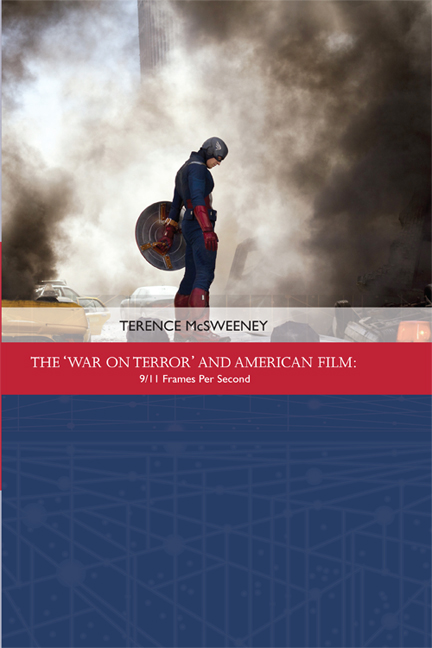Book contents
- Frontmatter
- Contents
- List of Illustrations
- Acknowledgements
- Introduction
- 1 The Lives of Others: Vulnerability in Post-9/ 11 American Cinema
- 2 Boots on the Ground: The New Millennial Combat Film as Cultural Artefact
- 3 ‘Masters of our own Security’: Redemption through Violence in the Post-9/ 11 Action Genre
- 4 Turning to the Dark Side: Challenging American Mythology in the Superhero Genre
- 5 Remaking 9/11: Imagining the Unimaginable in the Alien- invasion Film
- 6 Decade of the Dead: Zombie Films as Allegory of National Trauma
- 7 The Rise and Fall of Empires: The ‘War on Terror’ as Allegorical Moment in Historical Film
- Conclusion
- Bibliography
- Select Filmography
- Index
Conclusion
Published online by Cambridge University Press: 05 August 2016
- Frontmatter
- Contents
- List of Illustrations
- Acknowledgements
- Introduction
- 1 The Lives of Others: Vulnerability in Post-9/ 11 American Cinema
- 2 Boots on the Ground: The New Millennial Combat Film as Cultural Artefact
- 3 ‘Masters of our own Security’: Redemption through Violence in the Post-9/ 11 Action Genre
- 4 Turning to the Dark Side: Challenging American Mythology in the Superhero Genre
- 5 Remaking 9/11: Imagining the Unimaginable in the Alien- invasion Film
- 6 Decade of the Dead: Zombie Films as Allegory of National Trauma
- 7 The Rise and Fall of Empires: The ‘War on Terror’ as Allegorical Moment in Historical Film
- Conclusion
- Bibliography
- Select Filmography
- Index
Summary
Moreover, although the two towers have disappeared, they have not been annihilated. Even in their pulverised state, they have left behind an intense awareness of their presence. No one who knew them can cease imagining them and the imprint they made on the skyline from all points of the city. Their end in material space has borne them off into a definitive imaginary space.
Jean Baudrillard, The Spirit of TerrorismOne way of decoding the traumatic terror at the heart of the codification of ‘9/11’ is in fact to read it as a form of historical amnesia, a collective repression, that corresponds best with the globalised spectacle of its having made the apparently invulnerable evidently vulnerable … That vulnerability was too memorable to be allowed to be remembered. Fabricating instantaneous enemies and moving targets, one on the trail of the other, thus became the principal modus operandi of the virtual empire.
Hamid Dabashi, ‘Native informers and the making of the American empire’I think that what people go to the movies for has changed since 9/11. I still think the country is in some form of PTSD about that event, and that we haven't really healed in any sort of complete way, and that people are, as a result, looking more toward escapist entertainment. And look—I get it. There's a very good argument to be made that only somebody who has it really good would want to make a movie that makes you feel really bad.
Stephen Soderbergh, ‘The state of cinema 2013’In September 2011, exactly ten years after 9/11, Kenneth Lonergan's long delayed New York-set drama Margaret was finally released. The film had actually been shot six years before in 2005 and it is a text imbued with the visceral intensity of the immediate post-9/ 11 years: from its heated classroom debates about American foreign policy to its melodramatic and highly metaphorical narrative about a privileged American teenager, Lisa (Ann Paquin), whose momentary flirtation with a bus driver causes a crash that kills a woman who subsequently dies messily in her arms. Like many films of the era, Margaret provides us with a vivid testimony of the turbulent decade and, as Andrew O'Hehir (2012) commented, it is like a ‘time capsule from George W. Bush's America’.
- Type
- Chapter
- Information
- The 'War on Terror' and American Film9/11 Frames Per Second, pp. 199 - 209Publisher: Edinburgh University PressPrint publication year: 2014



